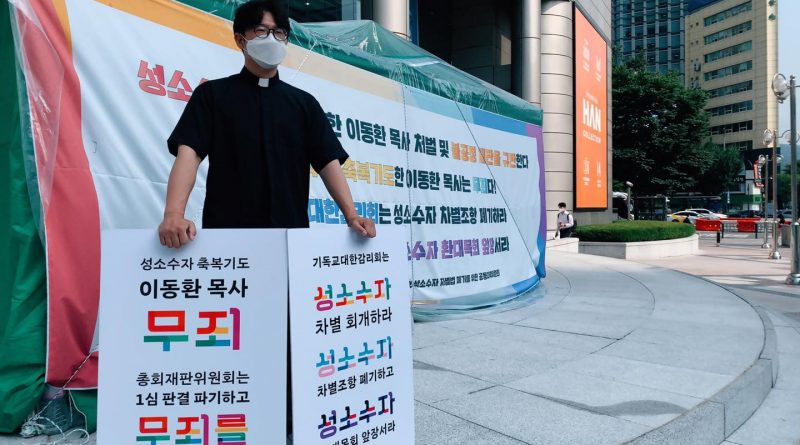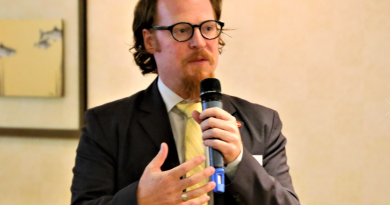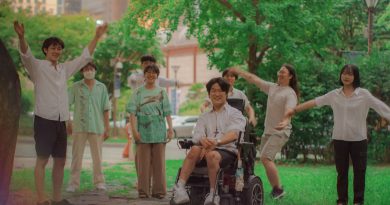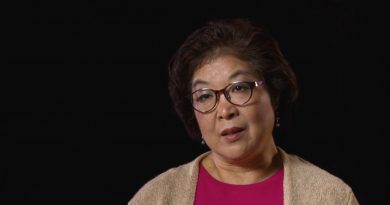Interview with Rev. Lee Donghwan, a Korean pastor suspended for blessing LGBTQ
An Interview Rev. Lee Donghwan who was sentenced to two years of suspension of his ministry by the Church court of the Korean Methodist Church (KMC) for blessing the sexual minorities.
1. What happened?
In August 2019, we held a blessing ceremony at the 2nd Incheon Queer Culture Festival. A priest of the Catholic Church, a Protestant pastor, and I conducted the ceremony. The message of the ceremony was, “we are equal and unique in God, God loves us as we are, we dream of a world of love and equality, not of hatred and discrimination.”
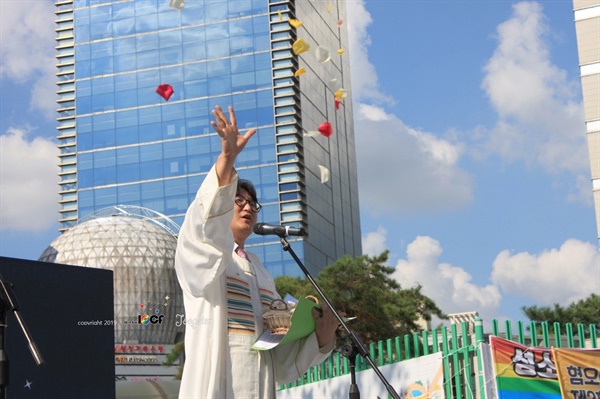
The law of the KMC, which I belong to, stipulates that, “when members violate the law, gamble, or sympathize with homosexuality, they are suspended, dismissed from ministry and eventually excommunicated from the Church.” Several groups in the KMC accused us of violating this law. In September 2019, I was accused by the Gyeonggi Conference of the KMC and went through several interrogation processes for about nine months. They gave me an offer saying that if I declare, “Homosexuality is a sin and I’ll never do this again”, they would make it go away. But I couldn’t accept such an offer when I think about my queer friends and my other friends around me. Even if I will be dismissed from ministry and excommunicated form my Church, I couldn’t make a statement that went against my conscience or deny the existence of my loved ones. That’s how I was brought to trial. The trial was a mess and the accusers have repeatedly insisted, “Homosexuality is a sin and you were in favor of homosexuality,” as if living in the Middle Ages. Eventually, I was sentenced to two years’ suspension of ministry in October 2020.
I have insisted that, “blessing cannot be a sin,” and that I had no choice but to disobey the ruling of the Church court because I firmly believed that, “all beings are in God’s love,” and immediately filed for an appeal (my Church has 2 court system), but the appeal process was not smooth. The General Assembly’s court committee held a closed-door trial and confiscated my cell phone because they felt burdened by the risk of the contents of the trial being released outside. There was also an absurd incident in which the person who had accused me sat as the chairman of the court committee. Even though I complained about this, they have kept holding the trial making one excuse or another. There is an internal law that requires the trial to be ruled on within two months, but neither the General Assembly’s court committee nor the administrative officer took responsibility. It’s already been nine months since the first trial. Nearly half of the two years of suspension have already passed, and there is no guarantee that a ruling will be made within a year. While the waiting is so long, my congregation members I’m in charge of are abandoned and the KMC General Assembly Office is not taking any action. I and my wife have lost our daily lives and are suffering from various physical and mental ailments.
2. You were suspended for two years under Article 3(8) of the canon law of the KMC. Do you have any plans to organize a movement to revise it?
It is true that at first, I thought it was my personal problem, and that’s how I went to trial. However, seeing the situation of my Church in the struggle, and seeing what’s happening in the Church because of me, I think the movement for revision of the canon law of the KMC is really urgent. About 140 young pastors in their 30s and 40s issued a solidarity statement after hearing what I had been through. Then the General Assembly Homosexuality Committee and the anti-queer movement began to search out the people who signed onto the statement. The Committee posted the names on to the public places. In the case of the associate pastors, their senior pastors told them to remove their names, and some threatened to cut off their sponsorship. The Committee also threatened that it would probe their faith, saying that it was a violation of Article 3-8 to sign onto such a statement. At that time, I realized this would not only be a problem for me, but for my colleagues who are currently in ministry and for everyone preparing for ministry in the KMC. So, of course, my safety is also an important issue as to how my trial results come out, but more fundamentally, I thought I should abolish this evil law discriminating against the sexual minorities. Thankfully, in the wake of my trial, about 120 pastors in their 50s and 60s have launched a Methodist Association meeting to oppose the hatred and discrimination. This kind of meeting is more valuable because the role of senior pastors in the General Assembly is important in revising the canon law. Along with being tried, I will also participate in the canon law revision movement with my seniors group.
3. Please share your thoughts on the Korean Church’s position on discrimination and hatred, especially from the context of the KMC.
The hate and discrimination in the Korean Church has reached to a serious level. Previously, there had been an organized movement against homosexuality, especially among organizations on the politically extreme right and religious fundamentalism, but it was happening outside the Church. However, after the KMC established the so-called Homosexuality Punishment Act in 2015, and the anti-sexual minority voice has begun to dominate the entirety of Korean churches. All the cases, including the cases of Prof. Huh Ho-ik, PCK seminary students, Rev. Im Bo-ra, and Rev. Lee Dong-hwan, have proved it. Korean Society, due to the growing awareness on the human rights, will eventually accept the recognition of same-sex marriage, including the anti-discrimination laws, but Christianity is likely to be the most disruptive group on this journey. In this regard, we need serious measures on how to change the inside of the Church.
4. Lastly, what would you like to say to the ecumenical community around the world?
I will take intensive action with protest against the continuing delay in the trial, declaring my innocence and mobilizing a movement to abolish Article 3-8 in the KMC canon. Next week I will start a tent sit-in protest in front of the KMC headquarters. I don’t know how effective this action will be, but I together with my colleagues will do my best to resist and shout. I would appreciate it if the global ecumenical community could join forces and pray for the human rights of the LGBTQ community in Korea, especially against hatred and discrimination in the Church. In addition, if possible, it would be a great help if the global ecumenical community can send us a statement of support and solidarity as well as a letter of concern about discrimination to the KMC leadership.
- Edit by Shin Seung Min

